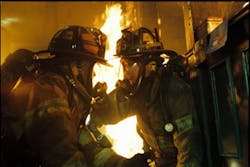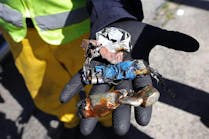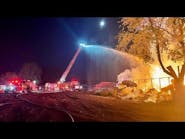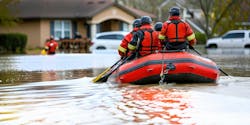Firehouse.com Interview: Ladder 49 Director Tells The Story Behind The Movie
More: Full Ladder 49 Coverage, Clips & More
"Ladder 49" Director Jay Russell spoke with Firehouse.com about his upcoming film starring Joaquin Phoenix and John Travolta, and why he chose to take on a project about the fire service.
Russell touched on everything from his first move of calling up his retired firefighter uncle, to the guidance he received on location from Baltimore firefighters, to the fulfillment he and his crew have felt at the so far overwhelming approval the movie has received from the firefighter community.
The director also touched on his artistic approach to the movie, saying anyone, firefighter or not, can identify with the theme that runs through all of his films: that life is precious. He said the story is about the appreciation of moments in life, which Phoenix's character explores as he reflects on his life while trapped in a Baltimore high rise inferno.
Firehouse.com: Before "Ladder 49," did you have any prior experience or interest related to the fire service?
Russell: I've sort of been around it all my life, but the real interest came when I began making the movie. My uncle was a career firefighter and retired after 30-some years on the service in Little Rock, Arkansas, which is where I grew up. And one of my friends from high school became a firefighter, and has been a firefighter over 25 years now.
So I've been around it a long time but have sort of always taken it for granted. When I got involved in this project the first person I called was my uncle to talk about it. So it was both familiar and unfamiliar to me.
Firehouse.com: What was it that made you want to get involved in a story about the fire service?
Russell: With any film that you take on it's all about the characters and the story. These characters in this story are strong no matter what the situation is, and the situation happens to be that they're firefighters. That's the way I always approach a film, is first do I care about these characters.
Firehouse.com: When making this movie, did you get your inspiration from anything in particular, such as a certain story or person, or September 11th?
Russell: I think on September 11th, on that unfortunate date, the world learned the sacrifice firefighters are willing to make. And once you dig below the surface, beyond September 11th, you see that those sacrifices are being made every single day. That's when I really started to get emotionally involved in this story.
It's a challenging lifestyle because any given day something can go wrong, and that's a very dramatic and very difficult way of life.
Firehouse.com: What did you do personally to prepare for this movie?
Russell: I got to Baltimore as soon as I could. Joaquin Phoenix and I were the first two on the scene; we both arrived in Baltimore about the same time which was easily two, two and a half months in advance of shooting the film. And Joaquin, of course, having to portray a firefighter in the film, went the whole distance and enrolled in the academy, and really went through a lot of the experience of what it takes to become a firefighter.
I was around the whole time and spent time in firehouses in Baltimore, would stop in and observe Joaquin at the academy when I could, and then did a little bit myself. I put on the equipment and went through the maze, went into the burning structure and experienced the blackout of the smoke, and put myself through as much as I could to experience it firsthand.
I went out on any number of runs with different companies in Baltimore and caught two fires. When I got in there I actually went into one of the buildings that was on fire, and once I got up on the third floor of this row house I suddenly got that feeling of "anything could happen." I felt safe with the guys I was with, but I mean this building could collapse at any second. It was really both exciting but also a kind of frightening experience.
Firehouse.com: What made you choose Joaquin Phoenix and John Travolta for the lead roles?
Russell: Well first and foremost they're terrific actors, I've been fans of their work for years. I think Joaquin, of all the young actors out there, I think he's the best. He fully commits to a part. He doesn't just pretend to be a character, he becomes the character, and that's why he went through such extensive training and research for the film.
And John is a lot the same way. And he does command a certain amount of authority and he has a certain presence, and I thought he would be very believable as a captain and then a deputy chief. And John, being a pilot himself, understands training and commitment to training and all of that. And once I got to know John I learned that the town he grew up in in New Jersey was populated primarily by firefighters, so he had a real strong feeling for this movie as well.
Firehouse.com: Was there a lot of pressure to be very realistic about the fire service and was that a big concern for you?
Russell: Well it was. Let's face it, the audience really doesn't know what it's like, so the accuracy that I tried to portray in the film was more for the firefighters. I wanted them to feel like we came close to getting it right.
Now there's no way we're going to be able to get it right 100 percent. First of all I mentioned when I went into the burning structure at the academy, and you get that blackout of the smoke; well that doesn't really portray much of an image for the audience. They can't watch a black screen the whole movie. So there's a sequence in the film where I try to suggest what it's like getting lost in the smoke, and I tried the best I could to capture the essence of what it's really like for the firefighters.
I apologize in advance to them in knowing that I could never fully capture what they do because it's just impossible to capture on film, because of the circumstances - but I feel like we came damn close.
We had firefighters on the set all the time, I had a couple of advisors who are current firefighters on the Baltimore City Fire Department... and the other thing I know is every fire department from around the country has different approaches in terms of their work, so we just followed the lead of the Baltimore Fire Department. Like I said, I feel like we got close but it was very important to me, to attempt anyway, to get it right.
Firehouse.com: There are of course comparisons to the movie Backdraft - was there anything that you purposely did differently in your representation of the fire service?
Russell: Well I've talked to firefighters about what they felt about Backdraft - what they liked about it, what their criticisms were - and I tried to improve on it. You know it's ironic though, I don't want to bash Backdraft too much because Ron Howard was actually quite helpful to me in the preparation of the film. I got together with Ron and asked him what he learned, what would he have done different the next time out. So Ron was very helpful to me, and again I know there were some certain criticisms of Backdraft from the fire service but it's hard for me to be too critical because Ron was so helpful to me.
Firehouse.com: Was there anything particular that you learned from the firefighters on scene?
Russell: We basically learned everything from the firefighters on scene.
We would set up an scenario and I would have an idea in my mind of how I wanted to approach it, and I always turned to the firefighters and said, "Ok here it is, how do we approach this?" So we basically took all of our cues from the firefighters.
And the other thing I learned - and it seems like a really obvious and stupid thing to say, but I'm going to say it anyway - I learned how hot fires are. Going into a couple of real fires, and the fires that we set on our set, I was really impressed and also just horrified at how hot the fires are. It's intense beyond my wildest imagination, and it makes me that much more in awe of what these people do because it's just crazy.
That's why I've said this is a movie about your next door neighbor who happens to be super hero. And they are super heros to me. I don't portray them as such because I know they're just regular human beings, but I look up to them as super heros because I just can't believe they do what they do.
Firehouse.com: Was there anything else that surprised you about firefighters or their culture or their work?
Russell: It didn't surprise me but it's something that I tried to capture in the film, which is they are no different than you and I. There's the heroism and the bravery and there's all that that comes with their job, but they're also flawed human beings just like the rest of us. There's some people who are good people, some people who are bad people, there's some people who like to have a little too much fun, there's some people who don't want anything to do with that. There's no model for a firefighter. Each one is an individual and I tried to capture that in the film, and point out that you can't just lump them all into one mold. And again, that part didn't surprise me, but I'm hoping it might surprise the audience member who doesn't know anything about this world.
Firehouse.com: Were there any other messages or goals that you had for this movie? Did you intend it as a tribute?
Russell: It is, ultimately. We're the only major theatrical film coming out that deals with firefighting post 9/11. Now interestingly, the script was written before 9/11 but the film is - even though it is in no way a 9/11 film - it is the first and only film about firefighters that has come out post 9/11. So I've felt from day one we're carrying a huge responsibility with this movie, and for myself and all the cast members it is a tribute to firefighters for what they do. But also, we wanted to get it right. We want them walking out saying "You know what? They got it right." If they walk out feeling that, then I will feel that I've done my job.
Firehouse.com: Does this movie say anything about facing mortality? Was there anything you wanted firefighters to get from that experience in the movie?
Russell: Well I think that it's a movie that examines any number of challenges, dramatic challenges, that each firefighter faces... this reality of mortality always hovering around them but the fact that they just go out and do it. But also the pressures that come from that, both on themselves and on their families. This is a movie almost as much about the families as the firefighters themselves. Every day that the mother or father walks out the door to go do this job as a firefighter could be the last day their family sees them, and that's just an unimaginable amount of pressure. And yet they somehow deal with it, and that's really a big part of this movie.
Firehouse.com: Does this movie have any similarities or trends to your previous movies? ("Tuck Everlasting," "My Dog Skip")
Russell: There's a very specific theme that runs through my movies, which is life is precious... and to appreciate very single day of it, because we are mortal beings. Death is a reality to all of us whether old age gets us or something else, so it's the appreciation of moments in life. That's a strong theme that I'm very interested in.
Firehouse.com: Was there anything special about this experience for you, compared to your past projects?
Russell: Well this was easily the most immersive experience I've ever had making a film and I expect it will be for the rest of my career. And that was the case for the cast members too. We all comment about the fact that it's been over a year now since we finished shooting the film, and yet we all talk to each other almost on a daily basis, certainly on a weekly basis. And when we're all in the same town together, we get together almost once a week or once every two weeks.
This never, ever, ever happens on a movie. It was because we all had this really unique emotional experience. It made a deep impression on our lives. I can tell you we're all going to be lifelong friends now and I think we got just a little taste of that bond that firefighters have by making this movie.
Firehouse.com: The movie received overwhelming approval at the recent screening at the Fire-Rescue International Conference and Expo in New Orleans. How does that feel?
Russell: That was our goal, and Robert Patrick was down there to introduce the film. He called me minutes after the screening was over and he was beside himself. I mean he was very emotional... he was 100 feet off the ground. He told me how they felt about the film and their reaction to it, and the things they said to him afterwards, and he was very moved. I was very moved just getting it second hand.
It was one screening but I'm hoping it will be like that in many others. It's a very powerful thing for us because we met this extreme weight of responsibility making the film and we just hoped that the firefighters would appreciate our efforts. And the fact that that group that night did, it was just very fulfilling, and just a great feeling.
Firehouse.com: Was there anything you wanted to say in this movie and weren't able to include?
Russell: Oh gosh there's a thousand things, literally a thousand, that in the film we sort of suggest. It's hard to point out any one specific thing because it was just literally hundreds and hundreds of great little moments that we would have loved to have captured, but when you start getting over two hours the audience gets antsy.
Firehouse.com: Is there anything else that you would like to add about your experience making this movie or your hopes for it?
Russell: Once again, it was a very unique experience. I felt like the Baltimore City Fire Department embraced us, they opened their doors to us. They believed that we were coming in with the right intentions, and we were, but they showed us the way.
I can't begin to express my gratitude for what they did for us, but I hope that this movie represents all the fire service, and not just in this country but internationally. We focus of course on one firehouse in one department which is in Baltimore, but we hope that it represents the experience all over the world in some form or fashion. That's our goal, and that's what I hope we've done.






